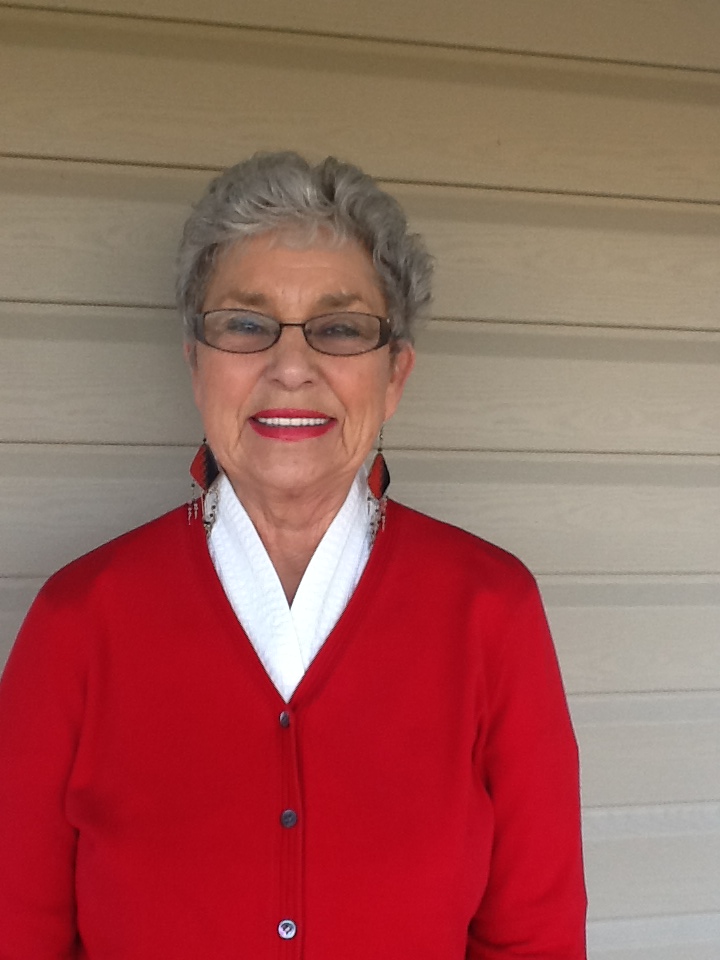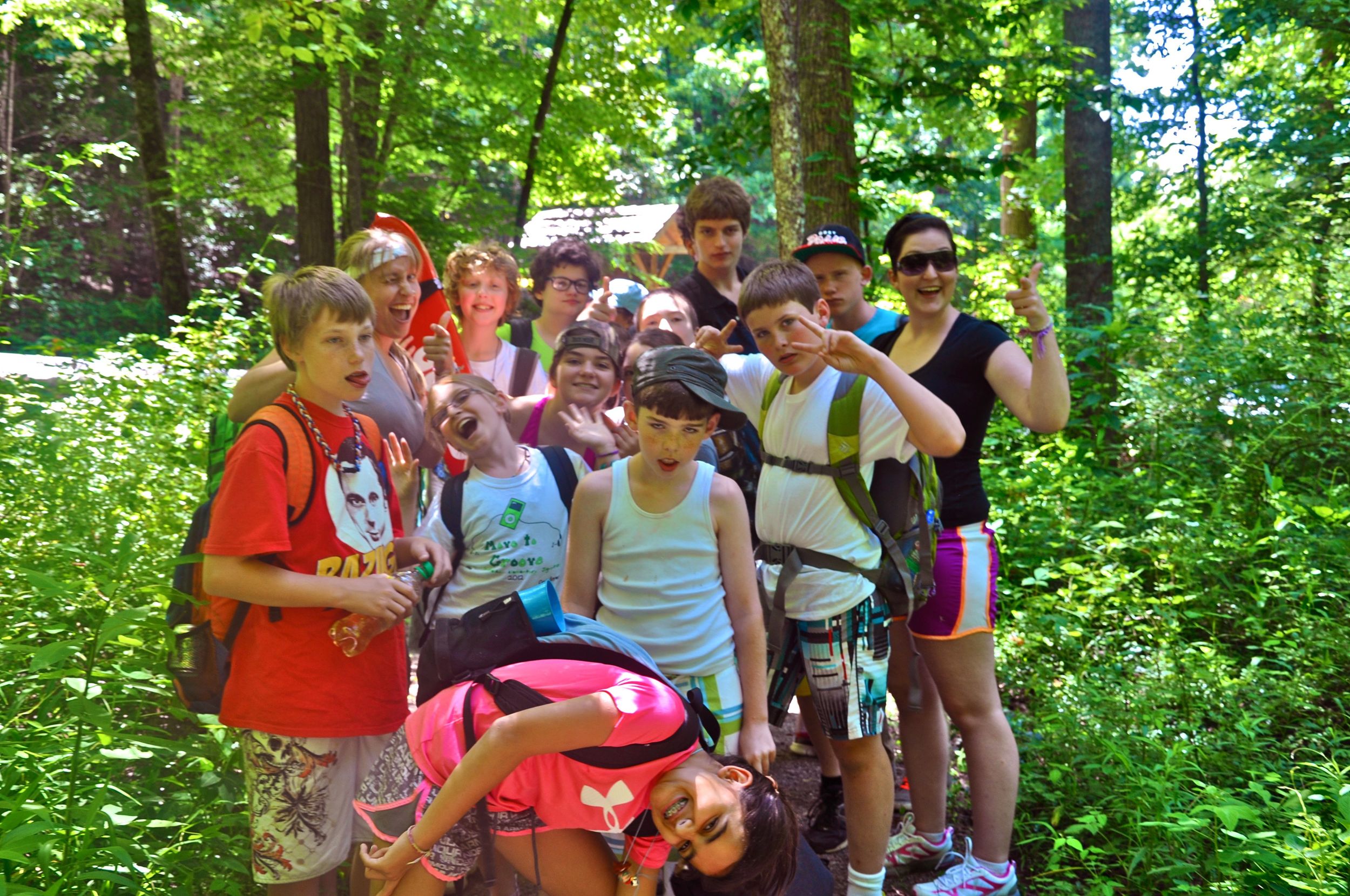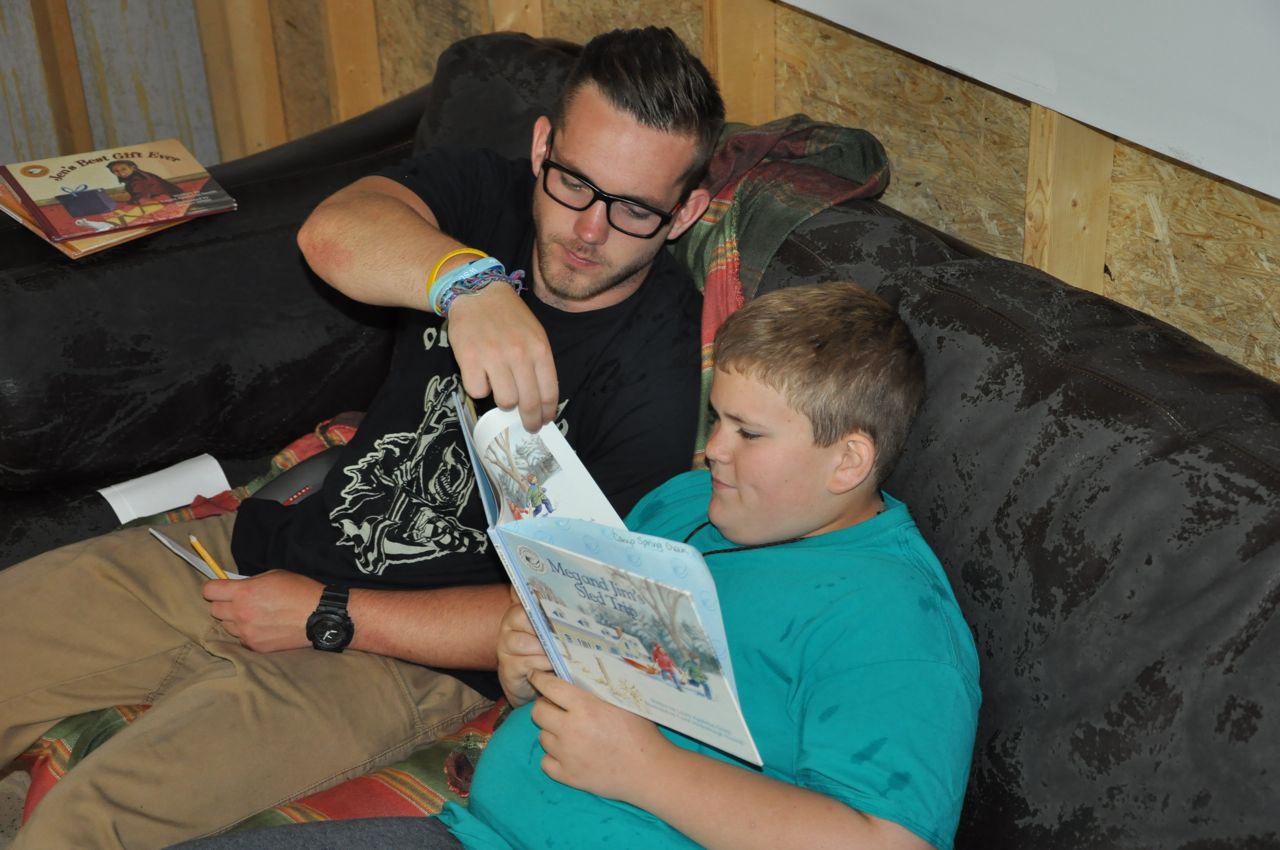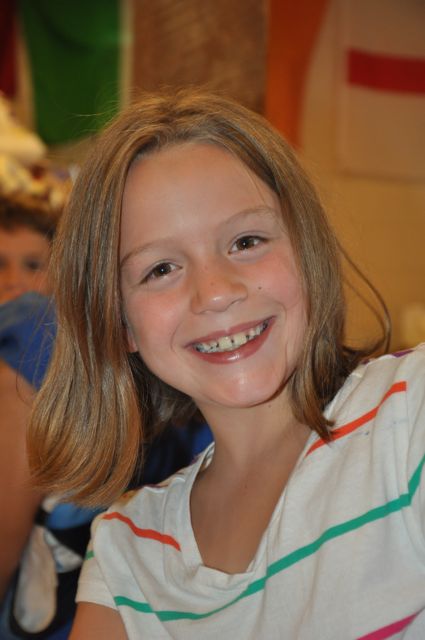Here's a group shot of our camp counselors during lifeguard training, which began June 5th and continues with general camp training right up until the last minute, when the campers arrive on June 15th. From near and far, we're overjoyed to have a stellar team this summer and can't wait to kick things off!
Susie on Summertime
 We took a few minutes to ask Susie about "summer slide" and any tips she might have for our readers--be you fans and supporters from afar, grandparents checking on your child at camp, or one of our many local followers dedicated to providing well-rounded educational experiences for your children. Here's a quick note from our co-director:
We took a few minutes to ask Susie about "summer slide" and any tips she might have for our readers--be you fans and supporters from afar, grandparents checking on your child at camp, or one of our many local followers dedicated to providing well-rounded educational experiences for your children. Here's a quick note from our co-director:
Summer is a season when children can spend more time playing, learning their own limitations, and problem solving in areas they feel drawn to. Society doesn’t allow much time for imagining anymore, but that is an important skill and we need to encourage our kids to dream. We also need to provide opportunities for our kids to develop critical thinking. At Camp Spring Creek, we want to keep our childrens' academic skills from sliding during the summer, but we value our outdoor time as much as our tutoring time.
For those reading our blog from afar, if your child has a natural interest in something, summer is perfect for devoting time to developing that interest. Be it cooking, hiking, building, or dancing—whatever their passion, there’s always a way to incorporate basic educational skills and keep it fun. This interest need not be an expensive hobby or something that requires high-tech equipment. Whatever they choose, we need to encourage our kids to dream and then reach for those dreams.
At the end of every school year, I take our children to a bookstore and let them pick a book that interests them for summer reading. If you can’t afford to buy a book, go to your local library and borrow a book. Most libraries have books on CD, which you can listen to while you’re taking a trip in the car or while you are sitting by a brook in the shade.
During the early years (and also in adult life), is important to build meaningful relationships and reflect on those relationships. We have always encouraged our children to write to family and friends during summertime and, often, they get mail in return. If a friend has moved away or a grandparent or other relative lives far away, this is a wonderful way to stay connected while also getting writing practice. Journaling is a private way to keep writing active and kids can get very creative with their journals, pasting in items and photos from different activities they have enjoyed.
In short, our golden rule: Get outside, play with friends, learn a new skill, dream, and write to your grandparents; like summer, they won’t be around forever.
Why We Eat Family-Style at Camp
"When people come together for meals there is more than nourishment for the body," says local potter and friend Shane Mickey. "There is nourishment for the mind and heart."
We feel the same way, and when we asked Shane if he would make serving dishes for our family-style meals at camp, we were touched by his response. "Susie worked with my son while he attended Montessori and that work enabled him to learn at a higher level," recalls Shane. "When I was approached by the camp to make the serving pieces, I considered it an honor to have my work be the presentation platform for all those fortunate campers and caring tutors and camp counselors." Shane says that family-style meals allow for more sharing, because people can gather and discuss the day's events, triumphs, and failures and therefore gain a deeper understanding of one another. Understanding yields support, and for children with dyslexia who may have self-esteeem issues due to struggles in the classroom, that support is a balm. Slow and steady, this adds up to happier children that grow into successful adults who contribute to society--most often through the innovative thinking that dyslexics are known to achieve.
"To me, Camp Spring Creek is a wonderful asset to our community because it not only adds to the diversity of businesses, but what it's mission entails and what they accomplish is heart-warming and incredibly important to the broader context of our society."
Thanks, Shane!
Summer 2014 Scholarships
We're delighted to announce that this summer we're offering 5 scholarships to campers through our partnership with OpenDoors of Asheville. The 5 campers will have 4 weeks as boarding campers, fully funded. These scholarships will go to children living in multi-generational poverty as a joint effort between Camp Spring Creek and OpenDoors to make positive, life-altering learning experiences accessible to children of any economic means in Western North Carolina. Last year's scholarship recipients from this partnership had moving things to say after their camp experiences. You can read excerpts from their letters here. We were also able to offer 2 scholarships at 50% to local children and are aspiring to raise another $7700 to support one more scholarship to give a local child 4 weeks of boarding at camp.
If you missed our demographic breakdown by age, gender, and location for this summer season, you can check out who comes to Camp Spring Creek. Suffice it to say, we have a waiting list for the first time in 10 years and we're taking names for early registration for 2015 right now! Please be in touch if you have questions, would like to be considered for a scholarship, or feel inspired to donate money to help us bring one more local child to camp this season!
Local Focus: Geraldine Ellis on Dyslexia and Success
 Today's post was originally published as a feature in our local newspaper.
Geraldine Ellis Retires, Reflects
Today's post was originally published as a feature in our local newspaper.
Geraldine Ellis Retires, Reflects
When Geraldine Ellis was passed the basketball during the final seconds of a game at Mitchell County’s then Bowman High School, she could fire off the winning shot. Not too many years later, when hired as an assistant for a local dentist’s office, she could remember patient names and faces with uncanny precision. Despite never earning her college degree, Ellis would go on to work in banking and customer relations for over twenty years, become Director of Mitchell County Chamber of Commerce, and eventually retire as Executive Director of United Way of Mitchell County in late 2013. But for all the things Ellis proved she could do, what she couldn’t do was easily spell or quickly comprehend large blocks of text.
“Connecting with people comes naturally to me…but if you hand me a folder and say, ‘There’s something interesting in here. Take a look at it and we’ll discuss it tomorrow,’ you can bet I’m not going to read it,” says Ellis, who was diagnosed with dyslexia in the early ‘70’s. Today, Ellis is speaking out in the community she dedicated her career to, with the hope that other children and adults who struggle with learning differences will have their needs met.
One in five children in the United States has dyslexia, along with more than 40 million adults, although very few are diagnosed during their education years, if ever. Parents and teachers are in the best position to notice early signs of dyslexia or other learning differences. In an atmosphere of support that is rich with resources and options, this potentially devastating setback can in fact be revealed as an exceptional gift.
Fourteen public school teachers in Yancey County and fifteen from Mitchell County have received Orton-Gillingham Associate Level certification. Five teachers from Mitchell have continued their training and mentorship, incorporating the strategies they have learned into their everyday teaching. Two feel so strongly about this training that they now present how to use these strategies in statewide teaching conferences sponsored by the Department of Public Instruction and Exceptional Children’s conference. This training and tutoring methodology uses a diagnostic and prescriptive, multi-sensory approach to teach the structure of language to children of all ages, abilities, and learning styles. “My great regret is that I did not go on to college,” says Ellis, who did not receive special assistance or tutoring of any kind during her education years. “I think the dyslexia held me back. I didn’t know my options at the time.” Although Orton-Gillingham, or OG as it is commonly called, provided successful remediation for children with dyslexia as early as the 1950s it is still a distant possibility in many education systems today.
“I remember one day working at the dentist’s office when my good friend Jane Brown brought her boys, Billy and Jerry, in for an appointment. She happened to be in the room when a supply salesman came in. The doctor told me to write a list down and place a supply order from that list. He said we needed ‘blue periphery wax,’” recalls Ellis. “I wrote ‘periphery’ and then I got stuck. I could not get the word ‘blue’ onto the page because of the ‘b.’ I asked, ‘What does blue start with?’ and they all looked at me. At that point, Jane asked me if I’d mind taking a few quick tests…come to find out, I had dyslexia.”
Dyslexia is a diagnosable learning difference under the umbrella of the Americans with Disabilities Act, guaranteeing equal access education through the public school system. “Dyslexia doesn’t necessarily mean you read backwards, as people often think,” says Susie van der Vorst, Co-Director of Camp Spring Creek and its Outreach Center and one of only 145 OG Fellows in the United States with almost 30 years experience.“People with dyslexia have difficulty processing language but they are often very gifted in analytical reasoning and creativity,” she explains, “which is why a high percentage of people with dyslexia become corporate CEO’s, engineers, artists, entrepreneurs, surgeons, and architects.”
Or community activists. Although Ellis is too humble to call herself as much, it’s difficult to take a look back at her career without noticing her gifted ability at viewing the big picture. While one common indicator of dyslexia is struggling with minute details or seemingly unconnected pieces of information, one strength of many dyslexics is their talent for thinking outside the box. When serving as Director of Mitchell County Chamber of Commerce, Ellis pinpointed a major local misconception that could potentially hinder growth and development. “It saddened me to hear local people—and I’m one of them—say, ‘Tourism doesn’t mean anything to us.’ In fact, the number of people our local craft artists attract is a huge part of Mitchell County tourism. We do have another industry besides mining and it’s been here all along, too. We can make both work for us and become aware of our unique offerings,” says Ellis.
Ellis applied this same creative thinking to get through challenging situations in school or, later in her professional life, business conferences and classes for professional development. “I’m a very visual person so I try to visualize success. It’s not helpful to look at some things as a negative; we need to look for the positive. I had to stop taking notes in class even though I was scolded for not paying attention. But I knew what I needed to do for myself in order to succeed and if I took notes, I got confused while trying to listen at the same time. I learned to rise above the confusion and I learned to worry about the resources that I had, instead of the ones I didn’t.” Furthermore, in her work for United Way, Ellis focused on “the big pool of people falling through the cracks.” She knew the support that local government and other organizations provided, but because of her longtime commitment to Mitchell County and her sense of vision, she also understood that huge numbers of people were being overlooked and were still in need. “At United Way the theme was ‘Taking care of our own,’ and I could really get behind that,” says Ellis.
Several months into retirement, Ellis says she is enjoying Bible Study and getting back to her walking routine. When asked what advice she has for those entering retirement themselves, she says, “Enjoy it!” When asked the key to a successful marriage, she advises: “The year that’s critical in your marriage is the year you’re in!” She and her husband, Kenneth, will celebrate 50 years of marriage this June.
Top 5 Ways to Avoid Summer Slide
 Children who spend summer vacation with hours of unstructured activity per day might be gaining independence and exploring their imaginations, but they will also lose math, reading, and spelling skills as a result of “summer slide.” Many families are unaware that a few simple steps can integrate learning into their children’s daily lives, picking up where traditional teaching methods fail without sacrificing those wonderful “daydreaming hours” associated with summertime.
One in five school-aged children has dyslexia, yet less than 1/3 of these students receives school services guaranteed to them by law for their reading disability. According to the National Center for Education Statistics, the high school dropout rate for students with dyslexia or related learning disabilities is more than twice the national average for students who don’t have a learning disability. During the summer months, most students lose two months of grade level equivalency in mathematical computation, and low-income youths lose an additional two months in reading achievement. For children with dyslexia, the numbers are even worse.
Children who spend summer vacation with hours of unstructured activity per day might be gaining independence and exploring their imaginations, but they will also lose math, reading, and spelling skills as a result of “summer slide.” Many families are unaware that a few simple steps can integrate learning into their children’s daily lives, picking up where traditional teaching methods fail without sacrificing those wonderful “daydreaming hours” associated with summertime.
One in five school-aged children has dyslexia, yet less than 1/3 of these students receives school services guaranteed to them by law for their reading disability. According to the National Center for Education Statistics, the high school dropout rate for students with dyslexia or related learning disabilities is more than twice the national average for students who don’t have a learning disability. During the summer months, most students lose two months of grade level equivalency in mathematical computation, and low-income youths lose an additional two months in reading achievement. For children with dyslexia, the numbers are even worse.
“Residential summer camps allow children to boost their self-confidence as they overcome homesickness. They spend time developing their interests and they can also focus on reading and writing while having fun,” says Susie van der Vorst, co-founder of Camp Spring Creek and one of only 145 actively training Orton-Gillingham Fellows in the United States.
van der Vorst recommends involving children in family plans, such as doing math to budget for the grocery store, organizing driving routes using maps for a family trip, or starting a family book club using self-selected material that everyone can enjoy. Citing nearly thirty years experience as an educational advocate for children with dyslexia and related learning differences, van der Vorst concludes that the most dynamic summer learning experiences for children happen in supportive social, outdoor, educational environments outside the home.
Camp Spring Creek’s day or boarding program offers the following opportunities to address summer slide and help create positive learning habits for children, so they become more dynamic, confident, curious learners:
- 1:1 Orton-Gillingham language tutorials using a proven diagnostic and prescriptive multi-sensory approach that teaches the structure of language.
- An hour of supervised oral reading at the camper’s independent reading level.
- Daily activities including art projects, swimming, wood shop, waterskiing, and outdoor education to encourage exploration and creative expression.
- Socialization with peers of different nationalities and socio-economic status through shared living spaces, teamwork opportunities, and memorable experiences such as campfire or singing.
- Math enrichment and math remediation as per the needs of each camper.
“We often see students make two to three years worth of progress during a six to eight week session at camp,” adds van der Vorst. “Our approach is designed to target a child’s individual strengths and weaknesses and help them excel, but we also recognize the value of keeping kids active throughout the day. Most campers grow as much in terms of ‘measurable’ skills as they do in self-confidence, communication skills, and their ability to take learning into their own hands.”
Camp Spring Creek is fully enrolled for the 2014 season, but welcomes names for its waiting list (you never know!) and early interest for 2015.
Dollar General Donates to Camp Spring Creek
Today's post was originally published as a press release in our local newspaper. Dollar General Makes Donation
Bakersville, North Carolina – April 21, 2014 – Under the guidance of Shirley Ledford, Dollar General in Bakersville donates supplies to Camp Spring Creek to help children with dyslexia.
Shirley Ledford, Manager of Dollar General in Bakersville, has approved donations to Camp Spring Creek valued at just over $100 for the second year in a row. The donated items included hole punchers, wall clocks, binders, notebooks, pencils, markers, Post-It Notes, and index cards. “This donation helps others and we enjoy doing that. I’m all for the children,” says Ledford. “Dollar General also supports causes related to literacy and the GED program, the animal shelter, as well as causes for autism and Saint Jude’s Hospital.”
Children attending Camp Spring Creek in Bakersville will use these supplies during their daily tutoring sessions in the Orton-Gillingham approach to language as they improve their reading and writing skills. This approach, which is specifically designed for children with dyslexia, is also used by a number of teachers in Mitchell County public schools who have received grant-funded training at the Camp Spring Creek Outreach Center. Orton-Gillingham teaches the structure of language using multisensory techniques that lead students to see, hear, and write a concept at the same time. Processing a single concept in many different ways allows children with dyslexia to grasp skills that can prove extremely difficult to learn using traditional methods.
Dollar General also donated Koosh Balls to Camp Spring Creek, which are used during an “Alphatoss Game” that teaches young readers about phonemic awareness. By listening to the smallest sounds that make up an individual word, repeating it out loud, and re-iterating each sound by tossing or catching the Koosh Balls, the children re-enforce their learning through multiple pathways, solidifying success.
Camp Spring Creek is currently enrolling for summer 2014 and some scholarships are still available for local children. Contact the camp office at 766-5032 for more information.
Camp Spring Creek Receives Anonymous Grant
 This press release was originally published in our local newspaper and we'd like to share the exciting news with our broader audience by re-posting it here, on today's blog.
This press release was originally published in our local newspaper and we'd like to share the exciting news with our broader audience by re-posting it here, on today's blog.
Camp Spring Creek Receives Anonymous Grant
Spruce Pine, NC – Last week, Camp Spring Creek received a grant in the amount of $2500 from the Anonymous Fund of the Triangle Community Foundation in Durham. “This was such a surprise and so altruistic,” said camp co-director and co-founder Susie van der Vorst, who did not apply for the grant nor have any affiliation with the organization.
The grant, which will be added to the camp’s operating budget, came completely unannounced and out of the blue. “This grant was made by a donor-advised fund here at the Triangle Community Foundation,” said Donor Services Officer Melchee Johnson. “Since it is anonymous, I cannot provide details on the selection process. Generally, our fund holders of donor-advised funds make grants to organizations they have great interest in or passion for. Before the grants are made, organizations are given due diligence to be sure they are in good standing.”
The Camp Spring Creek operating budget covers things like rent, utilities, and salaries, among many other line items. For instance, last year the Camp used part of its operating budget to supplement scholarships and the technology budget. This coming year, the camp is hoping to put up an archery fence to catch bows, so they don’t get lost down in the creek. “Ultimately, every gift provides opportunities for these children with eclectic learning styles and each gift makes our possibilities greater,” says van der Vorst. “We are very grateful.”
Interview: Van Westervelt
 Camp Spring Creek: Please tell us briefly how you become involved with the Learning Assistance Center at Wake Forest University and what your role is there:
Camp Spring Creek: Please tell us briefly how you become involved with the Learning Assistance Center at Wake Forest University and what your role is there:
Van Westervelt: Sure. I’m in my 16th year as the Director of the LAC and Disability Services. It has been a great experience here and I am highly engaged in providing academic support services for the undergraduate, graduate and professional school student body as well as disability services for any students who disclose a disability. We serve only Wake Forest students. To understand what we do, our mission statement best represents that. Here’s an excerpt: “…Our purpose is to strike a balance between providing direct assistance for skill building, while facilitating each student’s own discovery process for their individual learning and achievement style in and beyond the classroom…We strive to assist students in receiving accommodations that improve their ability to learn while assisting them to better understand their disability and realize that disability can co-exist with outstanding talents and outcomes.”
CSC: What fueled your interest in psychology and specifically in learning disabilities and dyslexia?
VW: My grandmother, Helene Durbrow, in the mid 1930’s had one son who in the 4th grade was struggling significantly with reading and getting very frustrated despite being quite bright in other areas. From her educational connections as a kindergarten teacher, she was referred to Samuel Orton MD, a neurologist at Columbia in NYC, who was working on intervention approaches for children with dyslexia, so she took her son to him for a consultation. Dr. Orton instructed her in a remediation plan for her son that was based on what is now known as the Orton-Gillingham Multisensory approach. He responded well and she was so good at applying this methodology that Dr. Orton began referring other students to her and that became her educational specialty. She received extensive training from Anna Gillingham, Mrs. Orton and Bessie Stillman as she started remedial programs at several private schools including Sidwell Friends in DC and Phillips Academy in Andover, MA.
Spurred on by encouragement from Dr. Orton and Anna, in 1946 she started a camp in Vermont at the foot of Mt. Mansfield and called it Camp Mansfield. Dr. Orton and his team realized that his students often lost significant ground over the summer and also the summer could provide an opportunity to focus on specific skills in need of remediation. Along with the educational focus at times in the day for peak attention, the camp had an array of recreation and outdoor challenge activities. My mother happened to be the Camp nurse, so from infancy my two brothers and I were able to escape the humidity of Baltimore city each summer and be fully involved in the nature and outdoor activities that Vermont had to offer. Helene took a position at Children’s Hospital in Boston training teachers there and continued to run the camp for 16 years. I remember the large wooden plaque that had the camp motto carved in it “A Strong Mind in a Strong Body.” I think that life style and philosophy must have really imprinted on me because first I became a physical therapist and then a child-adolescent psychologist!
Helene recruited a faculty of teachers who would reside at camp or commute from local towns for the whole 8-week session. One British teacher from the DC area, Diana King, was so impressed with the remedial approach that she learned from my grandmother that she would go on to establish her own school, Kildonan, and summer camp, Dunnabeck, both originally in PA, geared for bright students with dyslexia. My brother, Mark, would also go on to establish camp programs in the Baltimore area and become the Assistant Head of the Jemicy School for dyslexic students in Baltimore.
CSC: Your area of expertise is assessment and intervention. What would you say to a parent who does not have extra time, energy, finances, or community resources…but has a hunch that “something’s up” with their child’s learning style? How can this parent get his or her child what is needed within the family’s means?
VW: I think the first step would be to consult with the child’s teacher and see what his/her current school has to offer as far as assessment and intervention. A next option, if there is not insurance or funding for a private evaluation, would be to see if a local university has an evaluation clinic for learning difficulties. For example in our area, UNCG has two clinics, one for LD and the other for ADHD (336-334-5662), that offer evaluations on a sliding scale basis as far as costs. The testing is carried out by a doctoral student under the supervision of a faculty member. The assessments are quite thorough and the students from Wake Forest who I have referred there have found the results to be very helpful.
CSC: If you could help dispel one myth or stereotype about children with dyslexia, what would it be and how would you address it?
VW: Some of the early descriptions of difficulties experienced by children with dyslexia focused mainly on letter reversals and writing backwards. Through multiple research studies we now know the primary core deficit is in “phonemic awareness,” which for children without dyslexia is the rather automatic process involved in learning that words are comprised of particular component sounds that can be related to letters. Visual process difficulties that may show up as letter reversals can be associated with dyslexia but that is not the primary problem to focus on in remedial efforts.
Parents are sometimes told by well-meaning physicians or teachers “Oh he’ll grow out of it” but, as my grandmother used to advise, “You will either pay now or pay later!” This I took to mean that it was important to rally your resources early on to address the problem because addressing it later in a student’s life can be more complicated and require greater resources.
Job Openings at Camp Spring Creek
We're in need of several Certified and Associate Level Orton-Gillingham tutors for the Camp Spring Creek 2014 season. We only have a few openings left, but if qualified applicants are interested in working at camp from June 10 to August 10, please send your resume to our general email inbox: info@campspringcreek.org. Applicants may also contact us at the office by calling 828-766-5032. OG Training with us in advance of employment is sometimes an option, so don't hesitate to inquire. We also have a few tutor positions for half the summer. Applicants to these positions that are not returning staff will need to attend staff training at the start of the summer. In general, we prefer individuals that have already been through training via the Academy of Orton-Gillingham Pracitioners & Educators, but we can provide practicum observations. For example, if an applicant is hired and works the entire 8 weeks, he or she can use up to 5 observations for their practicum. Please be in touch!
Camp Spring Creek Featured in WNC Magazine
We're so proud to be featured in last month's print and online issue of WNC Magazine. Please take a moment to enjoy this brief feature by clicking HERE and scrolling down to Steve and Susie's photo.
Camp Spring Creek Seeks Teachers for Free Training in WNC
 This press release was originally published by local newspapers in Mitchell and Yancey Counties.
Spruce Pine, North Carolina – December 8, 2013 – Camp Spring Creek Outreach Center, a non-profit organization in Mitchell County, received grant funding to train up to 10 teachers and assistants in the Classroom Educator Class.
This press release was originally published by local newspapers in Mitchell and Yancey Counties.
Spruce Pine, North Carolina – December 8, 2013 – Camp Spring Creek Outreach Center, a non-profit organization in Mitchell County, received grant funding to train up to 10 teachers and assistants in the Classroom Educator Class.
Camp Spring Creek was recently awarded a $20,000 People in Need grant funded through the Community Foundation of Western North Carolina, the Lipscomb Family Fund, the Fund for Mitchell County, and the Nelle Crowell Fletcher and G.L. Crowell Fund. These monies are specifically allocated to train up to 10 public school teachers or assistants who work with children during the literacy block.
“We’re so grateful to all the organizations that contributed to make this funding possible,” said Camp Spring Creek co-director Susie van der Vorst. “Now we’re ready to make it known that there are 10 spaces available. Thanks to the grant, the training is free. We’re hoping for 5 teachers from Yancey and 5 teachers from Mitchell, and we can work with individual schedules to offer the course during their free-time.”
The Classroom Educator Class is a 35-hour course based on the Orton-Gillingham approach to learning. Participants will learn the structure of English, primarily focusing on specific methodologies for differentiating instruction to meet individual students’ unique learning needs within small group or whole class instruction. The course will cover phonemic awareness, syllabication, and the spelling patterns of our language, among other concepts.
"Orton-Gillingham training was definitely that 'missing link' in my professional training!” said Tamara Houchard, 6-8th grade ELA teacher at Harris Middle School, who has completed numerous trainings through Camp Spring Creek. From her basic training, she says she “was able to understand the foundations of the English language and, more importantly, able to teach my students—at any level—how to read, understand, and comprehend in a systematic and logical way. No reading teacher could ask for more from a training!"
While the Classroom Educator Class is especially designed for K-3rd and Exceptional Child teachers, “we will take anyone interested,” said van der Vorst. “We would like school principals to contact us if they have teachers or assistants who are interested.” Following course completion, participants will receive 1 year of mentorship through conferences and in-class visits from van der Vorst, who is also the instructor.
The Orton-Gillingham philosophy, or OG, as it is commonly called, uses a language-based, multisensory approach to learning that relies on a student’s problem-solving and creative thinking skills to circumvent processing weaknesses. Although OG is most commonly used for children with dyslexia, the method has been successfully incorporated into learning environments for students of all styles and abilities. For information, call the Camp Spring Creek Outreach Center at 766-5032.
Interview: Nicole Baker
 This week we interviewed inspiring individual Nicole Baker. Nicole has a Master of Arts in Psychology and is also a Specialist in Education with a concentration in Special Education. She’s also a Licensed Psychological Associate. Nicole founded and runs the Academic Assessment Center in Asheville, NC where we frequently refer families. Enjoy her thoughts on educational environments, parent advocacy, and more--including her own experiences being diagnosed with dyslexia.
Camp Spring Creek: What is your area of specialty?
This week we interviewed inspiring individual Nicole Baker. Nicole has a Master of Arts in Psychology and is also a Specialist in Education with a concentration in Special Education. She’s also a Licensed Psychological Associate. Nicole founded and runs the Academic Assessment Center in Asheville, NC where we frequently refer families. Enjoy her thoughts on educational environments, parent advocacy, and more--including her own experiences being diagnosed with dyslexia.
Camp Spring Creek: What is your area of specialty?
Nicole Baker: My specialty is children, reading, education, and implementing interventions within school systems. I assess children with standardized tests, but at the same time I look at their behaviors when performing academic tasks. We talk about school (what is fun, what is hard, what is easy, etc.) and I compile a report with my findings and suggestions for curriculum planning and accommodations. I also consider modifications that I think will be most helpful for the student. When doing this, I like to reference current literature and research and draw upon my individual experience as a learner with dyslexia. I use a multifaceted approach that is individualized to each student and takes into account their needs and applies best practices. In the end, my job is to identify a child’s needs and create a plan for them to succeed academically.
CSC: What are the most common psychological difficulties that children with dyslexia face and why do you suppose that is the case?
NB: I believe that ALL preschool and kindergarten education programs should be multisensory and developed around the Montessori/multisensory methodology of education. It is my belief that this type of education will do two things. First, it will help with early identification of students with learning differences. Second, it will help kids that may not be 100% LD make the early gains necessary to not go down the LD path. Strong, early multisensory education that is peace-centered and based in imaginary/play while also fostering independent learning ultimately builds the strong, early skills needed to form an exceptional backbone for future learning. Quality early childhood education is ESSENTIAL.
I also find that, in most cases, learning differences are being identified too late. I often get students in my office at the 3rd and 4th grade levels that are just being flagged as struggling in the classroom. Parents will often say that they asked teachers early at the kindergarten or 1st grade level, and they were told “it is too early to tell; you need to wait.” This is incorrect!
CSC: Recognizing that you respect the confidentiality of your clients, is it possible for you to tell us in general/anonymous terms about a particular moment of "ah-hah" or realization that you had with a child in your practice? What did you learn in that moment and what corner do you think the child turned?
NB: I work with a lot of high school and college age kids who are frustrated that their LD (dyslexia, ADHD, Executive Dysfunction, etc.) makes learning “hard.” I tell kids all the time: “Life is hard, but worth the work.” I think we are setting kids up for failure by letting them believe life is going to be easy or by protecting them from failure. I tell clients that my failures and struggles as an undiagnosed dyslexic have made me a tough, hard, worker who will almost never give up. If you want something bad enough, then it is worth working for. Beat the challenge and see how good it feels. I know better than anyone how hard your struggle feels, but if you find the one thing that you are passionate about (in my case psychology, reading, children) I call it a “hook,” then you can read higher than your reading level, comprehend better than any of these tests say, and “beat the odds” because that’s what LD kids do. We/dyslexic kids are great at thinking outside of the box and making things happen. Find your “hook” and make it happen!
CSC: If you could give one message to parents and educators of children with dyslexia, what would that message be?
NB: I would say to surround your children with books, music, art, and love. Turn off the darn TV and put down the cell phone (advice I should follow myself). All of these things will make he/she well-rounded, develop their vocabulary and experiential knowledge, and give them a sense of peace and well-being. Reading to your children and exposing them to books and print increases print awareness, love of reading, and general reading skills. Homes and schools filled with books, poetry, music, and art are fun, peaceful places where children can learn and grow happily.
Also, follow your parental intuition. If you feel early on in your child’s development that there is an issue or a need that your child has, listen to your gut and pursue answers. Further, pursue multiple opinions and work with people you are comfortable with and that you trust. If an answer, report, or finding from an expert feels wrong or off and doesn’t reflect what you honestly see in your child on a day-to-day basis, then dig deeper. Always be your child’s biggest advocate!
Interview: Nancy Burleson
 Camp Spring Creek is delighted to welcome Nancy Burleson to our Board. Nancy brings decades of educational and literacy experience to the Board, not to mention an affinity for Western North Carolina.
Camp Spring Creek: Please tell us a little bit about yourself.
Camp Spring Creek is delighted to welcome Nancy Burleson to our Board. Nancy brings decades of educational and literacy experience to the Board, not to mention an affinity for Western North Carolina.
Camp Spring Creek: Please tell us a little bit about yourself.
Nancy Burleson: I grew up in Spruce Pine, NC and have lived here all my life, with the exception of the four years I spent in college at UNC-Greenboro. I am a retired teacher with thirty years of experience in the Mitchell County School System. During that time, I spent most of my career in the fourth and fifth grades. For the last six years, I served as the Reading Coordinator for the county and worked in all of the schools. I have enjoyed being a part of the community and currently serve on the boards of the Spruce Pine Public Library, Spruce Pine Montessori School, and the Foundation Board of Blue Ridge Regional Hospital, in addition to that of Camp Spring Creek.
CSC: Can you share an early education memory of your own with our readers?
NB: I was fortunate to grow up in a home where education, and reading in particular, were valued and encouraged by my parents. I had a great uncle who lived with us when I was a child who read to me constantly. My mother told me that he enjoyed the experience so much himself that he would often read to me until he had no voice left. My parents were also avid readers, and I am sure their example had an early impact on my love for books.
CSC: What inspired you to volunteer for the Camp Spring Creek board?
NB: I am very interested in the mission and the entire experience of Camp Spring Creek. I have always had a passion for the importance of reading, especially in the early years, and feel that success in reading is necessary for success in school and in life. By meeting the needs of struggling readers, Camp Spring Creek is preparing children for success in both.
CSC: What part of the Camp Spring Creek mission or experience do you find most inspiring or important?
NB: I believe that the most inspiring and most important part of Camp Spring Creek is their genuine concern for education of the whole child in a rewarding and fun-filled experience. The desire of the directors to connect with the public schools is also commendable. Their commitment to the constant improvement of every area of their camp is truly inspirational.
Camp Spring Creek Heads to Pennsylvania
 This press release was originally through published in Bucks County, PA area media outlets in anticipation of our 1/6/14 Camp Show in Buckingham, PA. Read below for info about hosting a camp show in your area, and also some choice quotes from Camp Spring Creek's very own Susie van der Vorst.
Buckingham, Pennsylvania – January 6, 2014 – Summer camp for children with dyslexia offers film and open house.
This press release was originally through published in Bucks County, PA area media outlets in anticipation of our 1/6/14 Camp Show in Buckingham, PA. Read below for info about hosting a camp show in your area, and also some choice quotes from Camp Spring Creek's very own Susie van der Vorst.
Buckingham, Pennsylvania – January 6, 2014 – Summer camp for children with dyslexia offers film and open house.
Camp Spring Creek, located in the Blue Ridge Mountains of North Carolina, is an academic and recreational camp supporting dyslexic children ages 6 to 14. Invited by a local Doyelstown family whose child attended the camp, co-founder and director Susie van der Vorst will screen “How Difficult Can This Be? The F.A.T. City Workshop” by Rick Lavoie and facilitate a brief discussion afterwards. This unique film allows viewers to experience the frustration, anxiety, and tension that children with learning disabilities face every day, as if seeing it through the eyes of a dyslexic. The event is free, open to the public, welcomes children, and includes refreshments.
“Camp Spring Creek changed the way my daughter, Morgan, thought about her ability to read,” said mother and Doyelstown resident, Lisa McBride. “She came home with the understanding that she could face her reading and spelling challenges. As a result, her third grade year has been significantly better and she’s already excited to return to camp!” According to the camp co-director, children with dyslexia often have a hard time learning the skills associated with reading, spelling, and writing. “Dyslexia doesn’t necessarily mean you read backwards, as people often think,” said van der Vorst. “Children with dyslexia have difficulty processing language but they are often very gifted in analytical reasoning and creativity, which is why a high percentage of people with dyslexia become corporate CEO’s, engineers, artists, entrepreneurs, surgeons, and architects.”
With support, people with dyslexia often lead lives of accomplishment. Some of the most successful people in history had dyslexia, including Winston Churchill, Thomas Edison and Walt Disney. Some modern day people who have dyslexia are Robin Williams, Tom Cruise, Henry Winkler and Charles Schwab. “So many people with dyslexia are misunderstood,” said van der Vorst. “But just look at the wonderful role models we have! Many succeed in spite of their education. Imagine how they’d be if they had been instructed in the ways that they learn best.”
One of the most highly effective methods for such instruction is the Orton-Gillingham approach. It teaches the structure of language using multisensory techniques that lead students to see, hear, and write a concept at the same time. Processing a single concept in many different ways allows dyslexic kids to grasp skills they cannot learn using traditional methods. “We often see students make two to three years worth of progress during a six to eight week session at camp,” said van der Vorst. “Our approach is designed to target a child’s individual strengths and weaknesses and help them excel. But we also recognize the value of keeping kids active throughout the day. These kids can’t learn as well if they’re stuck behind a desk. The learning needs to be hands-on so that they can get multiple senses involved.”
The academic program at Camp Spring Creek includes one-on-one tutoring using the Orton-Gillingham approach, keyboarding and writing classes, one hour of reading aloud each day to camp staff, and one hour of study skills. Optional math remediation or enrichment is available as well. The activities offered by the program include wood shop, art, gymnastics, swimming, orienteering, and waterskiing. There are also field trips to explore the surrounding Blue Ridge landscape and culture.
Camp Spring Creek is one of only three residential camps in the United States accredited by the Academy of Orton-Gillingham Practitioners and Educators. The open house and film screening will be held Monday, January 6 at 7 p.m. at Trinity Episcopal, 2631 Durham Road, in Buckingham. For more information, call (828) 766-5032 or visit www.campspringcreek.org.
Giving More Thanks...
Note: We're holding a contest on our Facebook page this holiday weekend. Visit our page and post a photo of yourself or another adult reading with a child. Once you post the photo (and like our page so we can contact you if you win), you'll be entered to win a Camp Spring Creek mug! We're fortunate to have a few more very important people and organizations that we'd like to thank. We honored them in our Fall 2013 Newsletter, and would like to honor them on our blog as well:
We are profoundly grateful to our many dedicated and steadfast supporters, including the Rotary Club of Avery County. Thanks to everyone's efforts, we were able to award scholarships to eleven of our forty-three campers. We have always felt that reading is a civil right and that we need to offer our camp experience to children regardless of financial circumstances. With a continually growing network of supporters, we will be able to reach even more children next summer.
Our Bakersville Dollar General has always provided us with a generous discount for our binders and this year they supplied all the binders at no cost to us. Several of our own teaching staff made in-kind donations of books and teaching materials. Liz Hall, education advocate and avid supporter of Camp Spring Creek, is making hand-sewn slipcovers, curtains, and valances to enhance the interior of camp. Thank you to everyone, who helps us complete our mission.
We are also grateful to the Pelham Foundation for awarding us a technology grant. Funding from the grant and private donations allowed us to replace all the old computers with new iMacs and install Microsoft Office and iWorks software. We were also able to purchase a color laser printer, several Kindle Fires for reading hour, and iPads for our math program.
Additional thanks and recognition goes to the People in Need Grant, Mitchell County Community Foundation, and the Community Foundation of WNC who support our outreach mission by helping us provide multi-sensory instruction to local children attending our public schools. We are impressed with the caliber of dedication from the many teachers we have trained; they still seek our guidance by way of mentoring and further training. We are dedicated to continue to expand and solidify multi-sensory teaching strategies in our local schools. We are also assisting OpenDoors of Asheville in training teachers who work with their clients in the Buncombe County schools.
Thank you all for being a part of our community and letting us be a part of yours!
In Her Own Words: Scholarshop Sponsor Thank You
Dear Sponsor, I have learned a lot at camp, such as the butterfly stroke in swimming and how to divide words easily, so I can read better. I am learning to make a xylophone in woodshop. I have enjoyed doing swimming and art everyday and the zipline.
I could not have done a lot of stuff if I had not come to camp. I could not have gone rock climbing or done pottery or archery or met new people from all over the world and country.
Thank you from the bottom of my heart. I love camp and camp is so much fun. Thank you.
[4-week female camper, 11 years old]
In Her Own Words: Scholarship Sponsor Thank You
Dear Sponsor, I have learned a lot this summer. I learned how to hold my pencil correctly, new words, b/d's, how to read better, and cursive! I have enjoyed art. I liked working with clay. I have enjoyed woodshop where I have made my name, a book, a box, a birdhouse, yo-yo and a candy dispenser. I love playing fun games in tutoring! I made a lot of new friends. I would not have the chance to do woodshop at home or meet new people from all over the world! Thank you so, so much!
Love,
[female camper, 8 years old]
In Their Own Words: Adeline's Family
 This summer, camper Adeline participated in our Orton-Gillingham/Camp Counselor pilot program designed to benefit Mitchell County children. For four weeks, Adeline spent 2 hours at camp each day: one hour with her OG tutor and another hour participating in camp activities.
"One day Adeline came home and for entertainment she actually enjoyed making the flashcards," said her mother Tonya. "She made me a whole set and then she asked me, 'Mom, would you buy me some more 3x5 cards?' She'd never done anything like that before. We really appreciate what Steve and Susie and Camp Spring Creek did for us."
This summer, camper Adeline participated in our Orton-Gillingham/Camp Counselor pilot program designed to benefit Mitchell County children. For four weeks, Adeline spent 2 hours at camp each day: one hour with her OG tutor and another hour participating in camp activities.
"One day Adeline came home and for entertainment she actually enjoyed making the flashcards," said her mother Tonya. "She made me a whole set and then she asked me, 'Mom, would you buy me some more 3x5 cards?' She'd never done anything like that before. We really appreciate what Steve and Susie and Camp Spring Creek did for us."
Adeline is now in 7th grade at a local school. Her parents have lived here for over twenty years and love the Western North Carolina community. "It's refreshing here. I cannot imagine raising our girls anywhere else in the world," said Tonya. "We appreciate having a yard and such a beautiful view and land for animals and a garden. We have fruit trees, fresh asparagus, fresh flowers...We love it here."
The Houchard Family
 This post originally appeared in area newspapers to announce two remaining teacher scholarships and share the inside story of the Houchard family's experience with Camp Spring Creek and the Orton-Gillingham method.
This post originally appeared in area newspapers to announce two remaining teacher scholarships and share the inside story of the Houchard family's experience with Camp Spring Creek and the Orton-Gillingham method.
When Harris Middle School English Language Arts teacher Tamara Houchard first learned about the Orton-Gillingham (OG) methodology for teachers, she was sitting on a panel to observe fellow teacher Kristie Autrey’s National Board certification process. “I found out just enough to become interested and did some further research about the philosophy and methods of learning and instruction,” Mrs. Houchard recalls. In October of 2009, she enrolled in Camp Spring Creek Outreach Center’s Associate Level training in the OG method. This training is administered by Camp Spring Creek co-founder and dyslexia advocate Susie van der Vorst. Valued at nearly $1500, many scholarships are offered to Western North Carolina teachers for the training, including 2 for a training beginning later this month. Mrs. Houchard received a scholarship funded by the Samuel L. Phillips Foundation and completed her OG coursework during winter 2010.
“One of the greatest lacks I felt I had in my own teacher training was a consistent, research-proven method to approach reading instruction,” says Mrs. Houchard, who has taught in Mitchell County Schools for 15 years. “Even during my Masters and National Board work, I could not find an approach that seemed to be reasonable and agreed upon by many experts. OG seemed to address these issues and to be appropriate for every learner.” The OG method uses a language-based, multisensory approach to tutoring that relies on a student’s problem-solving and creative thinking skills to circumvent processing weaknesses. Although OG is most commonly used for children with dyslexia, it is successfully incorporated into learning environments for students of all styles and abilities. Currently, Mrs. Houchard is focused on modifying OG principles such as grammar basics, generalizations for spelling, and vocabulary foundations for best use in her classroom, where small-group work is not always possible.
Over the past several years, Camp Spring Creek has trained 11 Mitchell County teachers or assistants on full scholarships and plans to train even more. Assistant Superintendent of Mitchell County Schools Morgen Houchard (husband of Mrs. Houchard) hears nothing but positive results from teachers using OG methods in their classrooms. “Many have stated that OG is possibly the best reading training they have had,” says Dr. Houchard. “I would also agree that those teachers who have had the training seem to be very dedicated to student achievement and improvement.” Dr. Houchard, who has worked for 20 years in Mitchell County Schools as teacher, assistant principal, principal, director, and assistant superintendent says he believes a child’s education should be the most important thing happening in their lives and the lives of their family members. “If we can get parents and legislators concerned about education above and beyond quick fixes,” Dr. Houchard believes, “we will make great strides as a community. The more support, the fewer obstacles teachers will face in the classroom.”
Indeed, this summer Dr. and Mrs. Houchard sent their 8-year-old daughter, Josie Houchard, to Camp Spring Creek for 6 weeks as a day camper. Mrs. Houchard worked at the camp as an OG tutor, alongside Lissa Jo McMahan and Dennis Gilfillan, who also work in Mitchell County schools. “I really liked woodworking, art, and swimming. The lessons were fun and the teachers were great,” says Josie. “I was a little nervous [before camp] because I was younger and I did not know any campers there…but it was fine. I met a lot of nice people and I would tell my friends to go. You can really learn a lot!” During OG tutoring at the camp, Josie especially focused on generalized rules of spelling and cursive with her tutor. This year, Josie is in Mrs. Boone’s 3rd grade class at Deyton Elementary School.
Although Josie is not a child with dyslexia and does not exhibit learning differences in the classroom, both parents agree she clearly benefitted from healthy time outdoors with her peers and regular OG one-on-one tutoring sessions. “Josie made terrific reading and spelling growth over the summer, and furthermore her confidence in her reading abilities soared,” says Mrs. Houchard. “She enjoys reading even more, and is delighted at her stamina for chapter books.”
Educators, administrators, and parents interested in the OG method, training, and camp opportunities can contact Camp Spring Creek at 828-766-5032 or visit www.campspringcreek.org. The next OG Associate Level training is Sept 20-30 in Bakersville, and 2 heavily funded scholarship spaces are still available for public school teachers in Western North Carolina. Dates for camp next summer are June 15 through August 9, 2014.







